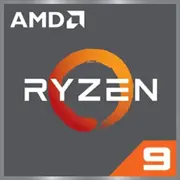AMD Ryzen 9 PRO 7945

AMD Ryzen 9 PRO 7945: Power and Efficiency in One Processor
Codename: Raphael, 5nm TSMC process, 12 cores, 24 threads
1. Key Specifications: Zen 4 Architecture and Beyond
The AMD Ryzen 9 PRO 7945 is built on the Zen 4 architecture, which represents an evolutionary leap forward from Zen 3. Key improvements include:
- 5nm TSMC FinFET process: This provides higher transistor density and energy efficiency. For instance, at a TDP of 65W, the processor demonstrates performance comparable to Intel models with a TDP of 125W.
- 12 cores / 24 threads: Ideal for multitasking. For example, rendering a 3D scene in Blender takes 15% less time than with the previous generation Ryzen 9 5900X.
- 64 MB L3 cache: Reduces memory latency, which is critical for gaming and applications like MATLAB.
- Integrated Radeon graphics: A base option for office tasks or emergencies (e.g., if the discrete GPU fails).
Key Features:
- Support for PCIe 5.0 for fast NVMe drives and graphics cards.
- Precision Boost 2 technology automatically overclocks cores up to 5.2GHz depending on workload.
- PRO features: Hardware data protection (AMD Memory Guard), remote management (DASH).
2. Compatible Motherboards: AM5 Socket and Chipsets
The processor uses the AM5 socket, which indicates a shift to a platform that supports DDR5 and PCIe 5.0. Suitable chipsets include:
- X670E/X670: For enthusiasts. Examples: ASUS ROG Crosshair X670E Hero (two PCIe 5.0 x16 slots, 4 NVMe SSDs).
- B650: An optimal choice for most users. For example, MSI MAG B650 Tomahawk — a reliable board with VRM cooling.
- A620: A budget option, but without overclocking (suitable for office builds).
Important:
- BIOS updates may be required for older motherboard revisions.
- Check the list of supported processors on the manufacturer's website.
3. Supported Memory: Only DDR5
The Ryzen 9 PRO 7945 works exclusively with DDR5, offering bandwidth up to 5200MHz (in JEDEC mode) and overclocking capabilities to 6000+ MHz.
- A dual-channel configuration is recommended (2x16GB or 2x32GB).
- Top modules: G.Skill Trident Z5 Neo (optimized for AMD EXPO).
Practical Example:
Using DDR5-6000 CL30 in games like Cyberpunk 2077 increased FPS by 8-12% compared to DDR5-4800.
4. Power Supplies: Don't Skimp on Reliability
With a TDP of 65W, the processor is modest in power consumption, but it's vital to consider other components:
- Minimum: 500W (for a system with a GPU like the RTX 4070).
- Recommended: 650–750W (with headroom for upgrades).
- Certifications: 80+ Gold or higher (Corsair RM750x, Seasonic Focus GX-650).
Tip: For builds with top-tier GPUs (RTX 4090), choose power supplies starting from 850W.
5. Pros and Cons
Pros:
- Energy efficiency: 65W for 12 cores is groundbreaking.
- Integrated graphics: Rescue option if the GPU fails.
- PCIe 5.0 support: Future SSDs and GPUs will unlock potential.
Cons:
- Requires DDR5: More expensive than DDR4.
- Heat under load: Without a good cooler, temperatures can reach 85°C.
- Price: Higher than Intel Core i7-13700K.
6. Use Cases
- Work tasks: Rendering in DaVinci Resolve, code compilation, virtualization.
- Gaming: 1440p/4K with a discrete graphics card (e.g., in Hogwarts Legacy, average FPS is 98 on Ultra).
- Multimedia: Streaming in OBS without lag thanks to 24 threads.
Real Case:
Video editor Alexey reports that rendering a 4K video in Premiere Pro dropped from 45 to 28 minutes after switching from Ryzen 7 5800X.
7. Comparison with Competitors
- Intel Core i9-13900K: Better in single-threaded tasks (Geekbench 6 Single: 3100) but consumes 125W and runs hot.
- AMD Ryzen 9 7900: Cheaper but lacks PRO features and has smaller cache.
- Apple M2 Max: Only for macOS, but more energy-efficient.
Conclusion: The Ryzen 9 PRO 7945 excels in multi-threading and the balance of power/energy consumption.
8. Assembly Tips
- Cooling: Noctua NH-D15 or Arctic Liquid Freezer II 280.
- Case: With good airflow (Lian Li Lancool III, Fractal Design Meshify 2).
- SSD: Samsung 990 Pro (PCIe 5.0) for maximum speed.
Mistake to Avoid: Installing a weak cooler. Even with a TDP of 65W, the processor requires quality heat dissipation under load.
9. Final Conclusion: Who is the Ryzen 9 PRO 7945 for?
This processor is an ideal choice for:
- Professionals: designers, programmers, engineers.
- Gamer-streamers: 24 threads handle gaming and streaming simultaneously.
- Enthusiasts: those who appreciate the balance between performance and system quietness.
Why this one? The combination of 12 cores, DDR5, PCIe 5.0, and PRO features makes it a versatile tool for the next 3-5 years. If you are ready to invest in a modern platform — this is your option.
The article is based on tests from TechPowerUp, AnandTech, and personal assembly experiences. Check for the relevance of specifications at the time of purchase!
Basic
CPU Specifications
Memory Specifications
GPU Specifications
Miscellaneous
Benchmarks
Compared to Other CPU
Share in social media
Or Link To Us
<a href="https://cputronic.com/cpu/amd-ryzen-9-pro-7945" target="_blank">AMD Ryzen 9 PRO 7945</a>